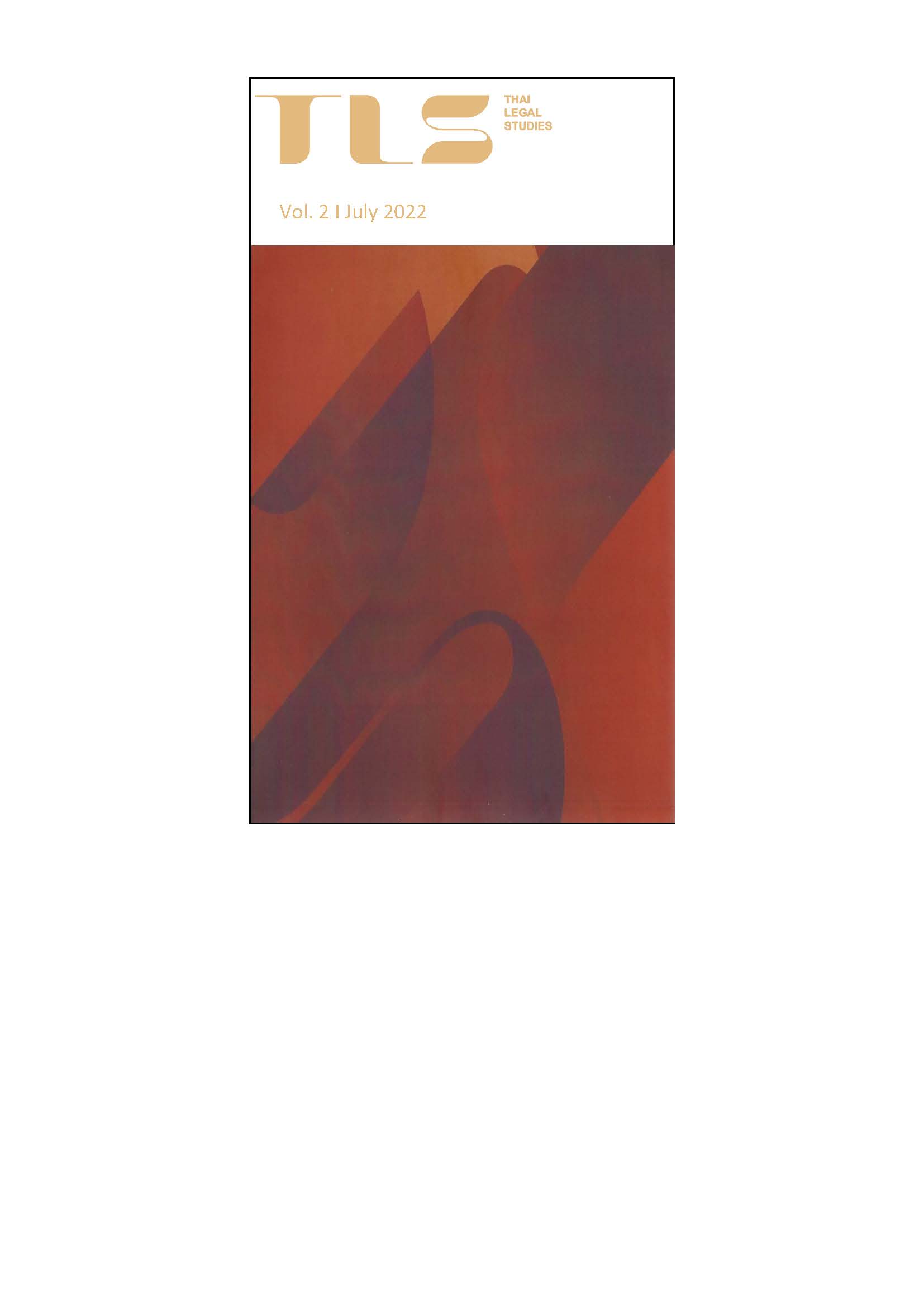Of Elephants, Horses, Bulls, and Buffaloes: The Historical Development of the Concept of Beasts of Burden as a Special Category of Movable Property in Thai Law
DOI:
https://doi.org/10.54157/tls.254138Keywords:
Property, Movable property, Legal history, Animals, Beasts of burden, ElephantsAbstract
The term “ช้างม้าวัวควาย” (chang-ma-wua-kway) is a familiar phrase to native Thai speakers. Literally “elephants, horses, bulls, and buffaloes,” it refers to the broader concept of beasts of burden. Beyond the realm of colloquial language, the concept of beasts of burden has led a fascinating life in the law. In the modern legal regime of Thailand, these animals constitute a special type of movable property in the Civil and Commercial Code of Thailand, attracting a similar legal treatment to immovable property. This article investigates the evolution of the legal concept of beasts of burden, from ancient sources, through the 19th century legal reformation period, up to the present day. The analysis reveals deep layers in the complex process of the country’s legal transplantation during the reform process: the exceptional nature of its current legal treatment is a product of particular social requirements in specific periods of history. This understanding of its dynamic social creation invites re-examination of the legal concept.
References
Archive of the Office of the Council of State. “Archives Concerning the Code on Things” (Document AC 13,98, Microfilm Roll 14, 1507/2102).
Archive of the Office of the Council of State. “Archives Concerning the Code on Things.” (Document AC 98/135–98/237 Microfilm Roll 14, 1647–1753/2102).
Archive of the Office of the Council of State. Document AC 13/1, 99, Microfilm Roll 14,
Archive of the Office of the Council of State. “Draft Code on Obligations: III Mortgages.” (Document AC 15/2, 32, Microfilm Roll 6, 12/1968).
Archive of the Office of the Council of State. “Memorandum on Several Questions about Things.” (Document AC 13/1, 99, Microfilm Roll 14, 1995/2021).
Archive of the Office of the Council of State. Sittings of the 18th–25th October 1916 (Examination of the Draft on Mortgage). (Document AC 38/385, Microfilm Roll 6, 438/1968).
Archive of the Office of the Council of State. “III. Drafts.” (Document AC 15/2, 32, Microfilm Roll 6, 87/1968).
Baker, Chris, and Pasuk Phongpaichit. “The Child is the Betel Tray: Making Law and Love in Ayutthaya Siam.” (2021) 1 Thai Legal Studies 1–21. https://doi.org/10.54157/tls.245734
Clarke, Alison, and Paul Kohler. Property Law: Commentary and Materials (Cambridge University Press 2005). https://doi.org/10.1017/CBO9781139051941
Engel, David M. Code and Custom in a Thai Provincial Court: The Interaction of Formal and Informal Systems of Justice (The University of Arizona Press 1978).
Girard, Paul Frédéric. Manuel élémentaire de Droit Romain (Rousseau 1929).
Griswold, A. B., and Prasert na Nagara. “The Inscription of King Rāma Gamhèn of Sukhodaya (1292 A.D.) Epigraphic and Historical Studies No. 9.” (1971) 49 Journal of the Siam Society 179–228.
Hall, Daniel George Edward. History of South East Asia (Macmillan International Higher Education 1981). https://doi.org/10.1007/978-1-349-16521-6
Harding, Andrew J. “Comparative Law and Legal Transplantation in South East Asia”. In David Nelken and Johannes Feest (eds), Adapting Legal Cultures (Hart Publishing 2001).
Harding, Andrew J. “The Eclipse of the Astrologers: King Mongkut, His Successors, and the Reformation of Law in Thailand.” In Penelope Nicholson and Sarah Biddulph (eds), Examining Practice, Interrogating Theory: Comparative Legal Studies in Asia (Martinus Nijhoff 2008) 307–42. https://doi.org/10.1163/ej.9789004165182.i-354.89
Hooker, M.B. “The ‘Europeanization’ of Siam’s Law 1855–1908.” In M. B. Hooker (ed), Laws of South-East Asia (Lexis 1988).
Ishii, Yoneo. “The Thai Thammasat (with a Note on the Lao Thammasat).” In M. B. Hooker (ed), Laws of South-East Asia, vol. 1 (Butterworth 1986) 198.
Loos, Tamara. Subject Siam: Family, Law, and Colonial Modernity in Thailand (Silkworm Books 2002).
Mousourakis, George. Fundamentals of Roman Private Law (Springer 2012). https://doi.org/10.1007/978-3-642-29311-5
Prachoom Chomchai. Gleanings of Private Law in a Roman and Anglo-Saxon Setting: A Preliminary Exercise in Legal History and Comparative Law, An Update and Recast English Version of the Thai Original (Thammasat University 2015).
Preedee Kasemsup. “Reception of Law in Thailand—A Buddhist Society.” In Masaji Chiba (ed), Asian Indigenous Law (KPI 1986).
Reekie, Surutchada, and Adam Reekie. “British Judges in the Supreme Court of Siam.” In Andrew Harding and Munin Pongsapan (eds), Thai Legal History: From Traditional to Modern Law (Cambridge University Press 2021). https://doi.org/10.1017/9781108914369.009
Sarasin Viraphol. “Law in Traditional Siam and China: A Comparative Study.” (1977) 65(1) Journal of the Siam Society 81.
Sayre, Francis Bowes. “The Passing of Extraterritoriality in Siam.” (1928) 22(1) American Journal of International Law. https://doi.org/10.2307/2188970
Schliesinger, Joachim. Elephants in Thailand Volume 2: Through the Ages (White Lotus 2012).
Tanin Kraivixien. “Thai Legal History.” (1963) 49 Women Law Journal 6.
Thornely, P. W. The History of a Transition (Siam Observer Press Ltd 1923).
Tokichi, Masao. “New Penal Code of Siam.” (1908) 18(2) Yale Law Journal 85. https://doi.org/10.2307/784476
Zwalve, Willem J. “A Labyrinth of Creditors: A Short Introduction to the History of Security Interests in Goods.” In Eva-Maria Kieninger et al. (eds), Security Rights in Movable Property in European Law (Cambridge University Press 2004). https://doi.org/10.1017/CBO9780511494987.005
Sources in Thai
“Roster of Foreigners Employed by the Ministry of Justice as Legal Advisors.” พิพิธภัณฑ์ศาลไทยและหอจดหมายเหตุ, สำนักงานศาลยุติธรรม ถนนรัชดาภิเษก กรุงเทพฯ. [Archive of the Court Museum of Thailand, the Office of the Courts of Justice, Ratchadaphisek Road, Bangkok.]
กฎหมายตรา ๓ ดวง ฉบับพิมพ์มหาวิทยาลัยธรรมศาสตร์และการเมือง เล่ม ๒ (สุขภาพใจ 2548). [Three Seals Code volume 2, printed by The University of Moral and Political Sciences (Sukapapjai 2005).]
กริสโวลด์, เอ.บี., และประเสริฐ ณ นคร. “คำนำ.” ใน มังรายศาสตร์ (พิมพ์เป็นบรรณาการในงานณาปนกิจศพของ หลวงโหตระกิตย์นุพัตร (อาสา โหตระกิตย์ 2514). [A. B. Griswold and Prasert na Nagara. “Introduction.” In Prasert na Nagara, Mangrai Sastra (Publication in memory of Luang Hotrakittayanupatra (Asa Hotrakittaya 1971)).]
กิตติศักดิ์ ปรกติ. หลักการโอนกรรมสิทธิในสังหาริมทรัพย์และหลักการได้มาซึ่งกรรมสิทธิ์โดยสุจริต: เปรียบเทียบหลักกฎหมายเยอรมัน อังกฤษ ไทย (วิญญูชน 2546). [Kittisak Prokati. Principles regarding the Transfer of Ownership in Movable Property and Principles regarding Good Faith Acquisition of Ownership: A Comparison between German, English, and Thai Law (Winyuchon 2003).]
ชัชพล ไชยพร. ประวัติศาสตร์กฎหมายไทย ภาคก่อนปฏิรูป (พิมพ์ครั้งที่ 2, วิญญูชน 2561). [Chachapon Jayaphorn, History of Thai Law: The Period before the Legal Reform (2nd edn, Winyuchon 2018).]
พระวรภักดิ์พิบูลย์. “กฎหมายเกี่ยวกับสัตว์.” (2504) วารสารสังคมศาสตร์ 243–57. [Pra Vorapakpibul. “Laws Relating to Animals.” (1961) The Journal of Social Sciences 243–57.]
แลงกาต์, ร. “อิทธิพลฮินดูในกฎหมายเก่าของสยาม” (ฐาปนันท์ นิพิฎฐกล, ผู้แปล). สุรศักดิ์ ลิขสิทธิ์วัฒนกุล, กรรณิกา จรรย์แสง, ร.แลงกาต์ กับไทยศึกษา (มหาวิทยาลัยธรรมศาสตร์ 2548). [R. Lingat. “L’influence indoue dans I’ ancient droit siamois” (Thapanant Nipitkul, tr). In Surasak Likasitwattanakul and Kannikar Jansaeng (eds), R. Lingat and Thai Studies (Thammasat University Press 2005).]
สราวุธ ปิติยาศักดิ์. (คำอธิบายกฎหมายลักษณะทรัพย์) (พิมพ์ครั้งที่ 2, นิติธรรม 2555). [Sarawut Pitiyasak. Explanation of the Law of Property (2nd edn, Nititham 2012).]
เสนีย์ ปราโมช. คำอธิบายประมวลกฎหมายแพ่งและพาณิชย์ บรรพ 3 ว่าด้วยค้ำประกัน จำนอง จำนำ (พระนคร: นิติบรรณาการ 2516). [Seni Pramoj. An Explanation of the Civil and Commercial Code Book 3 on Suretyship, Mortgages and Pledges (Nitibannakarn 1973).]
เสนีย์ ปราโมช. ศิลาจารึกพ่อขุนรามคำแหง. (ดุลพาห, ปีที่ 13 เล่มที่ 2 2509). [Seni Pramoj. “King Ramkamhaeng’s Inscription.” (Dulapaha Year 13 Vol. 2 1966).]
เสนีย์ ปราโมช. ศิลาจารึกพ่อขุนรามคำแหง–ตอนจบ. (ดุลพาห, ปีที่ 13 เล่มที่ 3 2509). [Seni Pramoj. “King Ramkamhaeng’s Inscription Part II.”(Dulapaha Year 13 Vol. 3 1966).]
เสนีย์ ปราโมช. อธิบายประมวลกฎหมายแพ่งและพาณิชย์: กฎหมายลักษณะทรัพย์ (พลสยามพรินติ้ง 2551). [Seni Pramoj. Explanation of the Civil and Commercial Code: Property Law, (PholSiam Printing 2008).]
อานนท์ มาเม้า. กฎหมายทรัพย์สิน: ความรู้พื้นฐานทางความคิด หลักทั่วไปและบทเบ็ดเสร็จทั่วไป (พิมพ์ครั้งที่ 2, วิญญูชน 2560). [Anont Mamount. Property Law: Fundamental Concepts, Principles and General Chapters (2nd edn, Winyuchon 2017).]
อานนท์ ศรีบุญโรจน์. กฎหมายประกันด้วยบุคคลและทรัพย์: ค้ำประกัน จำนอง จำนำ (พิมพ์ครั้งที่ 8, กรุงเทพมหานคร: วิญญูชน 2565). [Anont Sriboonroj. Law relating to Security by Persons or Property: Suretyship, Mortgages and Pledges (8th edn, Winyuchon: Bangkok 2022).]
Published
Issue
Section
License
Copyright (c) 2022 Surutchada Reekie, Adam Reekie

This work is licensed under a Creative Commons Attribution 4.0 International License.
Authors retain copyright and publishing rights without restrictions, but grant Thai Legal Studies the right of first publication in English and to distribute the work under a Creative Commons Attribution 4.0 International Public License (“CC BY 4.0”). It allows others to freely share the work, including the making of translations. There is no charge or fee for readers to immediately view published articles or content, and users are allowed to read, download, copy, distribute, print, search, link to the full texts of the articles, or use them for any other lawful purpose, without asking prior permission from Thai Legal Studies or the author(s), the only requirement being that an acknowledgement is given of the work’s authorship and its initial publication in English by Thai Legal Studies.







